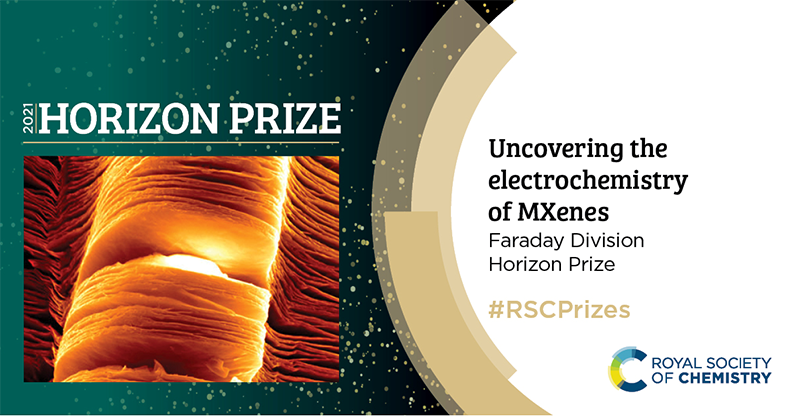
The MXene Electrochemistry team of Drexel University and Université Paul Sabatier has been named the winner of the Royal Society of Chemistry’s new Faraday Division Horizon Prize.
The collaborative team received the prize for novel studies on the electrochemical properties and energy storage applications of MXenes. They became one of the first winners of the Royal Society of Chemistry’s new Horizon Prizes, which celebrate the most exciting, contemporary chemical science at the cutting edge of research and innovation. These prizes are for teams or collaborations who are opening up new directions and possibilities in their field, through ground-breaking scientific developments.
The prize-winning work is a partnership between researchers developing novel two-dimensional (2D) materials - MXenes, led by Drexel Materials Distinguished University and Bach Professor Yury Gogotsi, and exploring their electrochemistry and energy storage applications, led by Patrice Simon at Paul Sabatier University. Other Drexel researchers who were recognized through this award are Prof. Michel Barsoum, Joseph Halim, Christine Hatter, Sankalp Kota, Ke Li, Maria Lukatskaya, Tyler Mathis, Asia Sarycheva, Patrick Urbankowski, Xuehang Wang, and Meng-Qiang Zhao. A full profile of the team and their work is available on the Royal Chemistry Society’s prize portfolio site.
After receiving the prize, Gogotsi said, “Carved stones, bronze and iron defined the progress of mankind in the Stone, Bronze and Iron ages, respectively. Paper, plastics and silicon led us to the current era. Nanomaterials are the building blocks of future technologies and we believe that MXenes will play a prominent role in solving energy, health and drinking water challenges that humankind is facing.”
MXenes are 2D nanometer-thin materials discovered at Drexel, where M stands for a metal, like titanium or molybdenum, and X for carbon or nitrogen. MXenes are a very large family of 2D materials with more than 100 stoichiometric structures possible, with a virtually infinite number of compositions if atoms are randomly mixed in a so-called solid solution, potentially making MXenes one of the largest families of inorganic materials in general, not just in the 2D world.
Thanks to the MXene’s structure, metallic conductivity, and potential for different compositions, they are promising for applications where high electronic/ionic conductivity and surface redox ability are needed. The team conducted an exploration of their electrochemical properties and energy storage mechanisms, with potential for the development of a new generation of electrochemical capacitors for storing renewable energy, powering transportation and the internet of things (IoT).
In announcing the award, Dr. Helen Pain, Chief Executive of the Royal Society of Chemistry, said, “Scientific discovery opens fascinating new frontiers, and we are proud to recognize those whose discoveries push the boundaries of knowledge and its application, and motivate others to follow in their footsteps. The astonishing achievements of the MXene Electrochemistry team are simply inspirational, and it is our pleasure and honor to recognize this by presenting this much deserved prize. In an era defined by the pandemic, where the contribution of chemical scientists has never been more clear, this achievement is truly a cause for celebration.”
The Royal Society of Chemistry is an international organization connecting chemical scientists with each other, with other scientists, and with society as a whole. Founded in 1841 and based in London, UK, they have an international membership of over 50,000. Their prizes have recognized excellence in the chemical sciences for more than 150 years. Of those to have won a Royal Society of Chemistry Prize, over 50 have gone on to win Nobel Prizes for their pioneering work, including 2019 Nobel laureate John B. Goodenough.
For more information about the RSC’s modern Prizes portfolio, visit rsc.li/prizes.